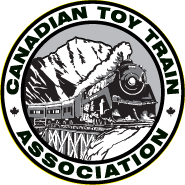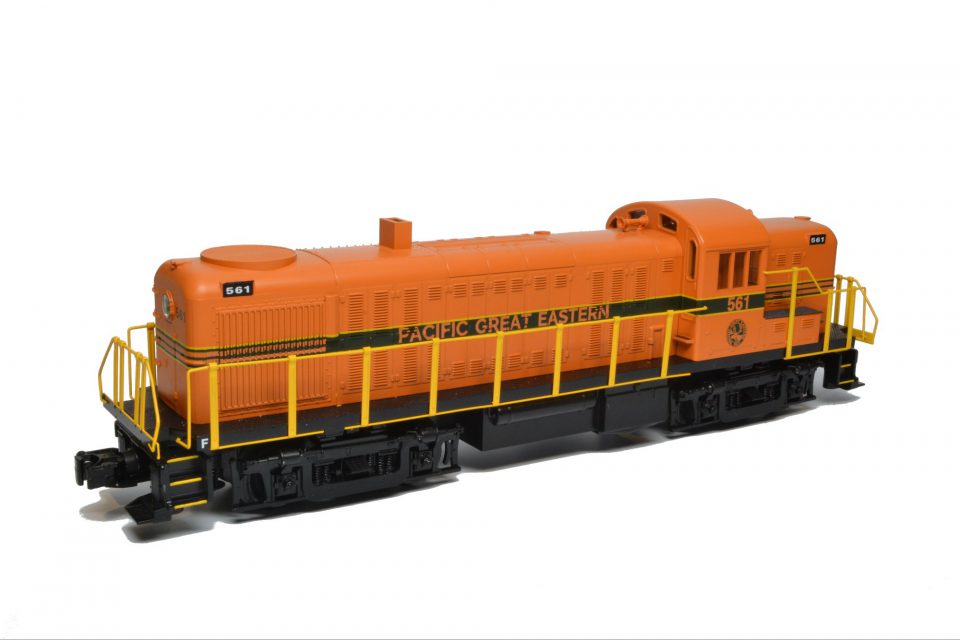SOLD OUT from CTTA Check your local hobby shop for availability
Cars may still be available at: Kelly’s Kaboose, Kamloops BC Central Hobbies, Vancouver, BC West Coast Railway Association
June 27, 2017. The CTTA is proud to announce our first locomotive project!
A PGE RS-3 from MTH will be produced in the Railking line. In support of our collection of previous PGE rolling stock, and by popular demand within the CTTA, we’re producing a very limited run of this 1st generation diesel in Pacific Great Eastern livery. This will make it possible for members to compile a complete Pacific Great Eastern freight train. The locomotive will complement the CTTA Club Cars previously released – tankers, reefers, trailer-on-flatcars, hoppers, crane and caboose.
This very limited production “O” gauge diesel comes in two road numbers (#561 and #565) in 3 rail. PGE RS-3 #561 is an operational locomotive and part of the operating fleet at the West Coast Railway Association Heritage Park, in Squamish, BC, near Vancouver.
The cost is $ 240.00 US plus $ 30.00 US shipping for a total of $ 270.00 US per engine. This works out to about $ 375.00 CDN, depending on the dollar. Delivery to members was completed in May 2018.
If you wish to order, MTH may produce limited quantities of this uncatalogued locomotive for sale at regular price. Check the MTH Web site here.
Prototype MTH Model shown below

About the RS-3 Diesel locomotive
By the time the first RS-3’s rolled off the assembly line in 1950, Alco had refined its road switcher concept to create “a truly universal locomotive which could do anything and go almost anywhere,” in the words of author J.W. Swanson in <i>New Haven Power</i>. In contrast with its predecessor, the 1000 hp RS-1, the 1600 hp RS-3 had all the power of a road diesel of its time and could boil along at up to 80 mph. For awhile in the early 1950’s, ALCO looked like a true contender in the burgeoning road switcher market. RS-3’s could be found on a majority of class one railroads doing everything from switching and transfer duties to mainline freight and even passenger and commuter service.
Ultimately, however, the RS-3 took a distant second place to Electro-Motive’s GP7 and GP9 in sales volume. Perhaps what doomed Alco was EMD’s already-commanding lead in the road diesel market – in part because EMD’s FT was the only road diesel allowed to be produced during World War II, when diesels began their takeover of American railroads. Other builders were relegated to producing diesel switchers until the conflict ended.
There was also talk that Alcos were less dependable. In hindsight, however, that seems to have been a result of EMD’s sales lead. Perhaps shop crews were simply less familiar with Alco’s model 244 prime mover and how to service it. In fact, roads with primarily Alco fleets, such as the New Haven, found Alco products to be very reliable when maintained properly. With their power and flexibility, RS-3’s proved their worth so successfully that many railroads kept them on active duty after other first-generation diesels had been retired. They survived on class 1 railroads until the Delaware & Hudson retired its last RS-3 in 1986 and remained active in shortline and industrial service for years afterward.
Bring the versatility of this do-anything/go-anywhere engine to your railroad with the RailKing Scale RS-3. Thanks to ProtoSound 3.0, our model features authentic Alco prime mover sounds, pulling power to match its hardy prototype, and a speed range from a slow crawl to full throttle.
Did You Know?
The first RS-3’s were delivered with an air-cooled turbocharger that soon proved troublesome. Most engines were later refitted with a more dependable water-cooled unit. The crosswise exhaust stack on our model indicates it has the later water-cooled version. (A turbocharger is a blower, driven by exhaust gases, that pressurizes air coming into the engine and thereby increases horsepower.)

